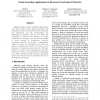Free Online Productivity Tools
i2Speak
i2Symbol
i2OCR
iTex2Img
iWeb2Print
iWeb2Shot
i2Type
iPdf2Split
iPdf2Merge
i2Bopomofo
i2Arabic
i2Style
i2Image
i2PDF
iLatex2Rtf
Sci2ools
131
Voted
CSE
2009
IEEE
2009
IEEE
Social Learning Applications in Resource Constrained Networks
Efficient design of social networking applications must take account of two guiding principles: the adaptive processes by which humans learn and spread new information, and the communication and technological constraints that in turn define the boundaries of human social behavior in virtual communities. In this paper, we introduce the concept of social learning in decentralized, resourceconstrained networks. We present a mathematical model for spread of information and derive the optimum strategy that minimizes the total cost of learning in cooperative social networks. We then extend our model to allow individuals to limit their cooperative behavior in spreading their knowledge. Our results demonstrate that increased cooperation reduces the overall cost and accelerates the rate of learning new information.
Related Content
| Added | 22 Jul 2010 |
| Updated | 22 Jul 2010 |
| Type | Conference |
| Year | 2009 |
| Where | CSE |
| Authors | Ali Saidi, Mahesh V. Tripunitara, Mojdeh Mohtashemi |
Comments (0)

